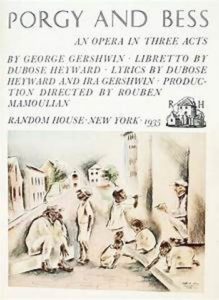
On this date in 1935, "Porgy and Bess" opened on Broadway. This was the first American folk opera about the lives of Black people.
"Porgy and Bess" was first performed with music by George Gershwin, libretto by DuBose Heyward, and lyrics by Ira Gershwin and Heyward. It tells the story of black life in the fictitious Catfish Row (based on the real-life Cabbage Row) in Charleston, S.C., in the early 1920s. Originally conceived by Gershwin as an "American folk opera," "Porgy and Bess" in its premiere in New York, featured an entire cast of classically trained Black singers, a daring and visionary artistic choice at the time.
Incorporating a wealth of blues and jazz idioms into the classical art form of opera, Gershwin considered it his finest work. Still, it was not widely accepted in the United States as a legitimate opera until 1976 when the Houston Grand Opera production of his complete score (followed nine years later by its Metropolitan Opera premiere) established it as an artistic triumph. The work is now considered part of the standard operatic repertoire and is regularly performed internationally.
Despite this success, the opera has been controversial; some, from the outset, have considered it racist. Virgil Thomson, a white-American composer, stated that "Folklore subjects recounted by an outsider are only valid as long as the folk in question is unable to speak for itself, which is certainly not true of the American Negro in 1935."
Duke Ellington stated, "The times are here to debunk Gershwin's lampblack Negroisms." Several of the original cast members later said they were concerned that their characters might play into a stereotype that African Americans lived in poverty, took drugs, and solved their problems with their fists.
A planned production by the Negro Repertory Company of Seattle in the late 1930s had been canceled because actors were displeased with what they viewed as a racist portrayal of aspects of Black life.
Another production of "Porgy and Bess," this time at the University of Minnesota in 1939, ran into similar troubles. Barbara Cyrus, one of the few Black students at the university at the time, members of the local Black community saw the play as "detrimental to the race" and as a vehicle that promoted racist stereotypes. The play was eventually canceled due to pressure from the Black community, which saw their success as proof of the increasing political power of Blacks in the Twin Cities.
This belief that "Porgy and Bess" was racist gained strength with the American Civil Rights and Black Power movements of the 1950s, '60s, and '70s. As these movements advanced, Porgy and Bess were seen as more and more out of place.
Gershwin’s all-black opera was also unpopular with some celebrated Black artists. Harry Belafonte declined to play Porgy in the late 1950s film version, so it was offered to Sidney Poitier, who regretted his choice.
Over time, however, the opera gained acceptance from the opera community and some in the Black community. Maurice Press stated in 2004 that "'Porgy and Bess' belongs as much to the black singer-actors who bring it to life as it does to the Heywards and the Gershwins."